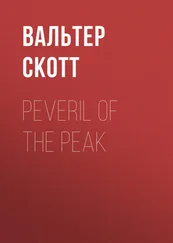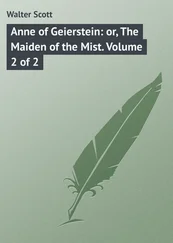Walter Scott - Peveril of the Peak
Здесь есть возможность читать онлайн «Walter Scott - Peveril of the Peak» весь текст электронной книги совершенно бесплатно (целиком полную версию без сокращений). В некоторых случаях можно слушать аудио, скачать через торрент в формате fb2 и присутствует краткое содержание. Жанр: Исторические приключения, на английском языке. Описание произведения, (предисловие) а так же отзывы посетителей доступны на портале библиотеки ЛибКат.
- Название:Peveril of the Peak
- Автор:
- Жанр:
- Год:неизвестен
- ISBN:нет данных
- Рейтинг книги:4 / 5. Голосов: 1
-
Избранное:Добавить в избранное
- Отзывы:
-
Ваша оценка:
- 80
- 1
- 2
- 3
- 4
- 5
Peveril of the Peak: краткое содержание, описание и аннотация
Предлагаем к чтению аннотацию, описание, краткое содержание или предисловие (зависит от того, что написал сам автор книги «Peveril of the Peak»). Если вы не нашли необходимую информацию о книге — напишите в комментариях, мы постараемся отыскать её.
Peveril of the Peak — читать онлайн бесплатно полную книгу (весь текст) целиком
Ниже представлен текст книги, разбитый по страницам. Система сохранения места последней прочитанной страницы, позволяет с удобством читать онлайн бесплатно книгу «Peveril of the Peak», без необходимости каждый раз заново искать на чём Вы остановились. Поставьте закладку, и сможете в любой момент перейти на страницу, на которой закончили чтение.
Интервал:
Закладка:
Charles walked hastily up and down the room as he expressed these unwonted sentiments, with energy equally unwonted. After a momentary pause, the Duke answered him gravely, "Spoken like a Royal King, sir, but—pardon me—not like a King of England."
Charles paused, as the Duke spoke, beside a window which looked full on Whitehall, and his eye was involuntarily attracted by the fatal window of the Banqueting House out of which his unhappy father was conducted to execution. Charles was naturally, or, more purposely, constitutionally brave; but a life of pleasure, together with the habit of governing his course rather by what was expedient than by what was right, rendered him unapt to dare the same scene of danger or of martyrdom, which had closed his father's life and reign; and the thought came over his half-formed resolution, like the rain upon a kindling beacon. In another man, his perplexity would have seemed almost ludicrous; but Charles would not lose, even under these circumstances, the dignity and grace, which were as natural to him as his indifference and good humour. "Our Council must decide in this matter," he said, looking to the Duke; "and be assured, young man," he added, addressing Julian, "your father shall not want an intercessor in his King, so far as the laws will permit my interference in his behalf."
Julian was about to retire, when Fenella, with a marked look, put into his hand a slip of paper, on which she had hastily written, "The packet—give him the packet."
After a moment's hesitation, during which he reflected that Fenella was the organ of the Countess's pleasure, Julian resolved to obey. "Permit me, then, Sire," he said, "to place in your royal hands this packet, entrusted to me by the Countess of Derby. The letters have already been once taken from me; and I have little hope that I can now deliver them as they are addressed. I place them, therefore, in your royal hands, certain that they will evince the innocence of the writer."
The King shook his head as he took the packet reluctantly. "It is no safe office you have undertaken, young man. A messenger has sometimes his throat cut for the sake of his despatches—But give them to me; and, Chiffinch, give me wax and a taper." He employed himself in folding the Countess's packet in another envelope. "Buckingham," he said, "you are evidence that I do not read them till the Council shall see them."
Buckingham approached, and offered his services in folding the parcel, but Charles rejected his assistance; and having finished his task, he sealed the packet with his own signet-ring. The Duke bit his lip and retired.
"And now, young man," said the King, "your errand is sped, so far as it can at present be forwarded."
Julian bowed deeply, as to take leave at these words, which he rightly interpreted as a signal for his departure. Alice Bridgenorth still clung to his arm, and motioned to withdraw along with him. The King and Buckingham looked at each other in conscious astonishment, and yet not without a desire to smile, so strange did it seem to them that a prize, for which, an instant before, they had been mutually contending, should thus glide out of their grasp, or rather be borne off by a third and very inferior competitor.
"Mistress Chiffinch," said the King, with a hesitation which he could not disguise, "I hope your fair charge is not about to leave you?"
"Certainly not, your Majesty," answered Chiffinch. "Alice, my love—you mistake—that opposite door leads to your apartments."
"Pardon me, madam," answered Alice; "I have indeed mistaken my road, but it was when I came hither."
"The errant damosel," said Buckingham, looking at Charles with as much intelligence as etiquette permitted him to throw into his eye, and then turning it towards Alice, as she still held by Julian's arm, "is resolved not to mistake her road a second time. She has chosen a sufficient guide."
"And yet stories tell that such guides have led maidens astray," said the King.
Alice blushed deeply, but instantly recovered her composure so soon as she saw that her liberty was likely to depend upon the immediate exercise of resolution. She quitted, from a sense of insulted delicacy, the arm of Julian, to which she had hitherto clung; but as she spoke, she continued to retain a slight grasp of his cloak. "I have indeed mistaken my way," she repeated still addressing Mrs. Chiffinch, "but it was when I crossed this threshold. The usage to which I have been exposed in your house has determined me to quit it instantly."
"I will not permit that, my young mistress," answered Mrs. Chiffinch, "until your uncle, who placed you under my care, shall relieve me of the charge of you."
"I will answer for my conduct, both to my uncle, and, what is of more importance, to my father," said Alice. "You must permit me to depart, madam; I am free-born, and you have no right to detain me."
"Pardon me, my young madam," said Mistress Chiffinch, "I have a right, and I will maintain it too."
"I will know that before quitting this presence," said Alice firmly; and, advancing a step or two, she dropped on her knee before the King. "Your Majesty," said she, "if indeed I kneel before King Charles, is the father of your subjects."
"Of a good many of them," said the Duke of Buckingham apart.
"I demand protection of you, in the name of God, and of the oath your Majesty swore when you placed on your head the crown of this kingdom!"
"You have my protection," said the King, a little confused by an appeal so unexpected and so solemn. "Do but remain quiet with this lady, with whom your parents have placed you; neither Buckingham nor any one else shall intrude on you."
"His Majesty," added Buckingham, in the same tone, and speaking from the restless and mischief-making spirit of contradiction, which he never could restrain, even when indulging it was most contrary, not only to propriety, but to his own interest,—"His Majesty will protect you, fair lady, from all intrusion save what must not be termed such."
Alice darted a keen look on the Duke, as if to read his meaning; another on Charles, to know whether she had guessed it rightly. There was a guilty confession on the King's brow, which confirmed Alice's determination to depart. "Your Majesty will forgive me," she said; "it is not here that I can enjoy the advantage of your royal protection. I am resolved to leave this house. If I am detained, it must be by violence, which I trust no one dare offer to me in your Majesty's presence. This gentleman, whom I have long known, will conduct me to my friends."
"We make but an indifferent figure in this scene, methinks," said the King, addressing the Duke of Buckingham, and speaking in a whisper; "but she must go—I neither will, nor dare, stop her from returning to her father."
"And if she does," swore the Duke internally, "I would, as Sir Andrew Smith saith, I might never touch fair lady's hand." And stepping back, he spoke a few words with Empson the musician, who left the apartment, for a few minutes, and presently returned.
The King seemed irresolute concerning the part he should act under circumstances so peculiar. To be foiled in a gallant intrigue, was to subject himself to the ridicule of his gay court; to persist in it by any means which approached to constraint, would have been tyrannical; and, what perhaps he might judge as severe an imputation, it would have been unbecoming a gentleman. "Upon my honour, young lady," he said, with an emphasis, "you have nothing to fear in this house. But it is improper, for your own sake, that you should leave it in this abrupt manner. If you will have the goodness to wait but a quarter of an hour, Mistress Chiffinch's coach will be placed at your command, to transport you where you will. Spare yourself the ridicule, and me the pain of seeing you leave the house of one of my servants, as if you were escaping from a prison."
Читать дальшеИнтервал:
Закладка:
Похожие книги на «Peveril of the Peak»
Представляем Вашему вниманию похожие книги на «Peveril of the Peak» списком для выбора. Мы отобрали схожую по названию и смыслу литературу в надежде предоставить читателям больше вариантов отыскать новые, интересные, ещё непрочитанные произведения.
Обсуждение, отзывы о книге «Peveril of the Peak» и просто собственные мнения читателей. Оставьте ваши комментарии, напишите, что Вы думаете о произведении, его смысле или главных героях. Укажите что конкретно понравилось, а что нет, и почему Вы так считаете.








